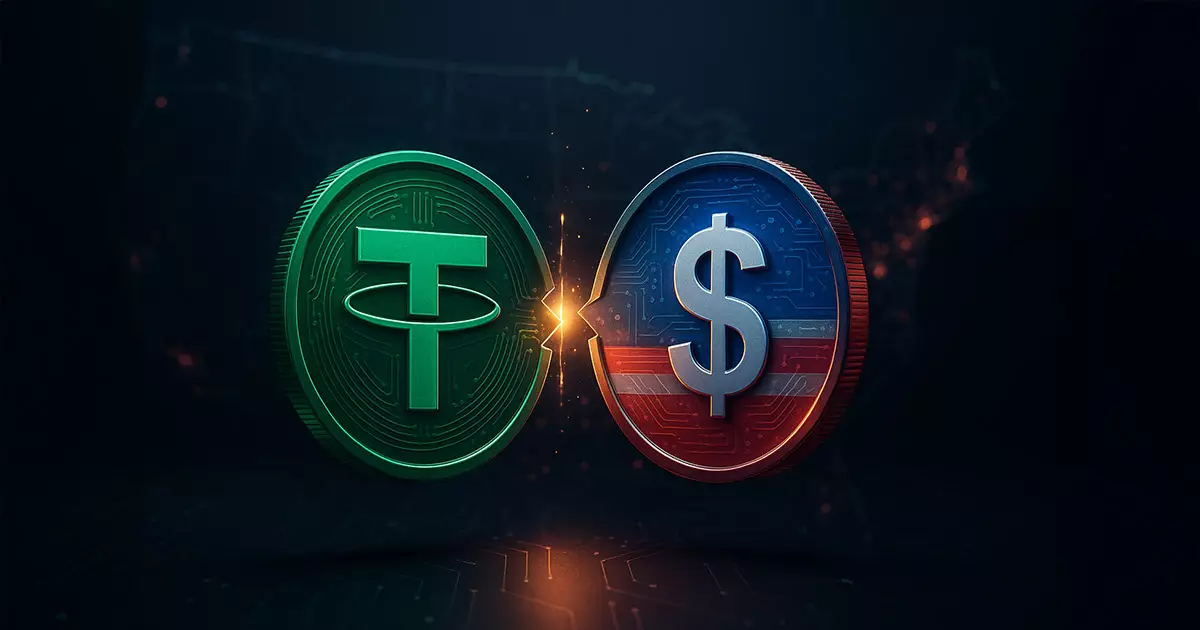The financial landscape is at a pivotal juncture, particularly as Tether’s CEO Paolo Ardoino openly discusses plans for a U.S.-specific stablecoin. Amid tensions surrounding regulatory frameworks, the Guiding and Establishing National Innovation for US Stablecoins Act (GENIUS Act) is becoming central to the conversation. Ardoino’s acknowledgment of the need for a compliant domestic stablecoin highlights a broader recognition that innovation must parallel regulatory clarity. Quite astutely, Tether is treading carefully, positioning itself as a pioneer in a sector that has often been critiqued for being unregulated and unpredictable.
This willingness to adapt to the legal landscape not only stands to benefit Tether but could also serve as a template for other digital currencies seeking legitimacy in an ever-evolving market. By aligning with the U.S. government’s regulatory expectations, Tether demonstrates a commitment to consumer protection while maintaining their innovation edge. This partnership with regulators could bolster public trust, a critical factor for the mainstream adoption of digital currencies.
Understanding Market Dynamics
While Tether focuses on compliance in the U.S. market, it continues to prioritize emerging economies where the need for stable financial solutions is acute. Ardoino emphasizes the millions of unbanked individuals in regions like Sub-Saharan Africa and parts of Asia, and rightly so. These underbanked populations require stable mediums of exchange, and the U.S. dollar, particularly in its digital form, offers a beacon of stability amid economic volatility.
The dichotomy is clear: while a domestic stablecoin aims to serve the diverse needs of the American market, the prevailing focus remains on providing solutions for those in dire need of financial tools. For rural farmers in Africa or small business owners in Southeast Asia, Tether’s USDT provides a lifeline to preserve wealth and facilitate international remittances. This multifaceted approach allows Tether to capture varied market segments, strategically positioning itself at the intersection of necessity and innovation.
The Future of Digital Transactions
Despite the foundational importance of Tether’s stablecoin in emerging markets, it seems prudent for Tether to pivot towards developing a U.S.-focused product. Ardoino’s remarks suggest that the planned domestic stablecoin will have “different feature sets” than USDT, which could include improved integration into the U.S. economy, enabling faster and more efficient transactions.
In a developed market saturated with payment options, the introduction of a compliant, user-friendly stablecoin could disrupt the current financial ecosystem. Given the U.S. market’s extensive array of payment methods, Tether’s entry might inject a much-needed competitive spirit into the existing financial services landscape. By catering specifically to U.S. consumers, Tether can also refine its product offerings, aiming to capitalize on niche markets often overlooked by traditional banks.
Regulatory Perspectives Matter
Admittedly, navigating regulatory frameworks can be cumbersome, yet Ardoino seems optimistic regarding the GENIUS Act’s potential for delivering clarity. The claim that this legislation could be more favorable compared to Europe’s MiCA regulation is noteworthy. By requiring that stablecoin issuers hold 100% of their reserves in cash equivalents, preferably U.S. treasuries, the GENIUS Act could bring a level of confidence to consumers disillusioned by the volatility often associated with cryptocurrencies.
Tether’s proactive approach suggests a keen understanding of the geopolitical nuances influencing financial markets today. By supporting legislation like the GENIUS Act, Tether not only positions itself strategically but also furnishes itself with a compliance roadmap that calls for rigorous adherence to reserve requirements.
The Promise of a New Financial Paradigm
Tether’s dual focus on both the U.S. and global markets illustrates a broader vision that seeks to redefine what a stablecoin can accomplish. By committing to address the concerns of the unbanked while also adhering to regulatory frameworks, Tether is demonstrating a forward-thinking approach that could be a game-changer in the financial landscape.
In an era where trust in financial institutions is waning, Tether has an opportunity to act as a catalyst for change, leading the charge towards a more secure and inclusive financial system. Such visionary efforts are what the industry needs if the promise of blockchain and digital currencies is to be realized fully.
As the U.S. Senate gears up for potential votes on the GENIUS Act, the implications for Tether—and indeed the entire digital finance industry—could be profound. Tether’s CEO seems to be steering the ship in a promising direction, and the financial world would do well to watch closely.



















Leave a Reply